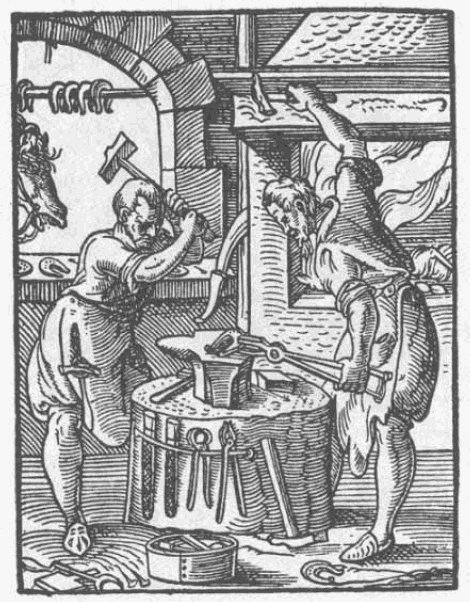The history of German family names – Part 2
- 30. Juni 2017 - General, Germany, Knowledge, Onomastics
Some time ago we released The history of German family names – Part 1 here on our blog. We didn’t forget that we promised a sequel. Today it’s finally here. This time we will talk about professions and nicknames as family names.
Professions/occupations as last names
In Part 1, we already used Josef the smith or later Josef Smith as an example. Indeed in the list of the most common family names in Germany, names that resulted from professions/occupations are leading. And the top ten family names are (in slightly changing rank order) without exception out of this group. On top is, unchallenged, the name Müller (or Mueller, Möller; in English Miller), followed by Schmidt (Smith), Schneider (Tailor), Fischer (Fisher), Meyer (or Meier/Mayer/Maier; an administrator or leaseholder), Weber (Weaver), Wagner (a wagon-maker), Bäcker/Becker (Baker) etc.
Many of these names can be found in different spellings. One example is the surname Schmidt. Every person that today is called Schmidt, Schmid or Schmitt can be traced back to the profession of a smith. In the beginning, when most people weren’t able to read or write, the names were written down in church books or documents of the town. Whoever wrote the names down did this in the way he thought fit which changed regionally as well as over time.
There was an especially high differentiation according to professions in the cities that were characterized by a high level of division of labor. In rural areas there were comparatively few different occupations. However, for one profession there was often a variety of different terms. A Bauer (farmer) might as well have been called Neubauer, Baumann or Ackerbauer.
Who today is called Hufnagel (horseshoe nail), Amboss (anvil) or Hammer (hammer), might still descend from a smith. As not only the pure professional title may have been used, but also derivations. Such indirect professional names may be for example the hammer as a typical tool, the steal (Stahl) as work material, the horseshoe nail as product or even the fire (Feuer) or spark (Funke) as side effect of the work process.

Nicknames as surnames
As mentioned in the first part of the history of German family names, there are many more origins of last names. For example terms were used that further described a person. They might have referred to physical or mental characteristics of a person as well as to character traits, habits or specific life events. Sometimes they were more, sometimes less flattering. The latter wasn’t seldom as it usually was precisely the abnormal, meaning everything that wasn’t within the norms of a community that did stand out.
The German swimmer Michael Groß (in English tall), fittingly also called “albatross”, rightly carries his surname as he is 2.01 meters high. Would his ancestor to whom the name goes back have been small, we would probably read about Michael Klein in the sport books today. Or, if he would have had curls, we might read about Michael Krause. Furthermore physical disabilities or diseases could result in a name; this explains the name Krummbein (bent leg).
Last names like Wilde (wild), Kess (saucy) or Weise (wise) imply character traits of the name giver. Not always features were described directly; metaphors or a figurative sense was possible. Someone with the name Spatz (sparrow) probably was dainty, a person called Hahn (cock) probably was a poser or quarrelsome. Likewise a surname could derive from eating or drinking habits (for example Fraas for someone who is greedy or Schluckebier for someone who drinks a lot of beer).
In the same way life events could result in a family name. Who for example is named Sonntag (Sunday), might descend from a person who was born on this day of the week.
Of course, there are many more possible origins of last names. We hope you enjoy the topic of name studies (onomastics) as much as we do. If you do, you can look forward to more parts of our blog series on the history of German family names.


0 Kommentare